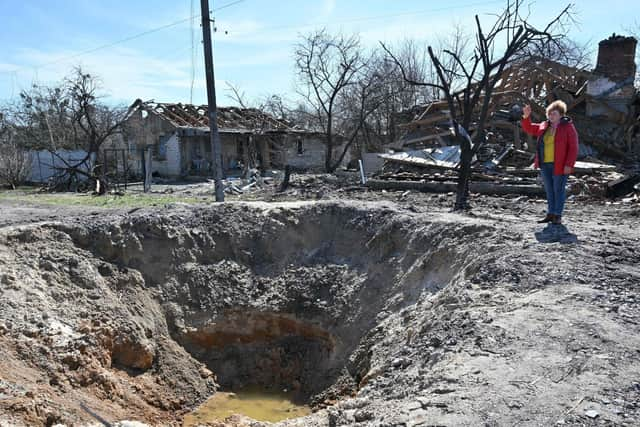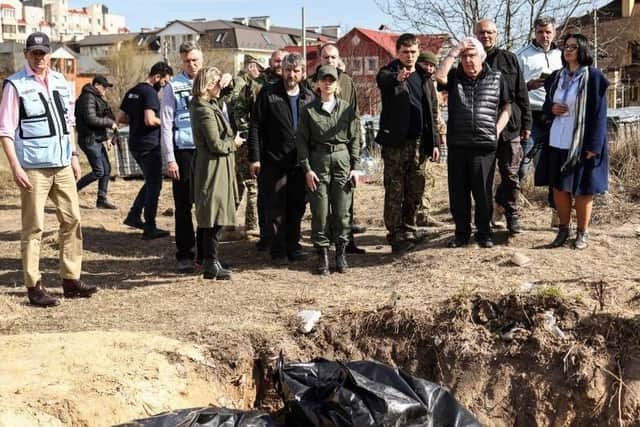Ukraine-Russia: 'I told my daughter, 'It seems daddy has died', says Ukrainian woman whose husband was shot by Russian soldiers for not having a cigarette
Dmytro Kuleba told Nato members that help from the West was urgently needed, warning that “many people will die” amid fears of an intensified battle in Ukraine's eastern regions.
Amnesty International said it had spoken to people who had direct experience of extreme Russian violence, including soldiers repeatedly raping Ukrainian women and deliberate killings of civilians.
Advertisement
Hide AdAdvertisement
Hide AdIts teams told of one woman whose husband was shot dead in front of their ten-year-old daughter after failing to give cigarettes to Russian soldiers who entered their home and another who was repeatedly raped while her young son was locked in another room.


Mr Kuleba said that weapons were vital to Ukraine holding off Russian forces, who are expected to focus their attention to the Donbas region after leaving the capital Kyiv.
“Either you help us now – and I’m speaking about days, not weeks – or your help will come too late, and many people will die,” he said. “I have no doubts that Ukraine will have weapons necessary to fight,” he said. “The question is the timeline. The battle for Donbas will remind you of the second world war with large operations, thousands of tanks, armoured vehicles, planes, artillery.”
Russian forces have withdrawn from the outskirts of Kyiv to regroup, as Ukrainian authorities urged people to immediately evacuate from the Donbas region before Russia intensifies its offensive.
Prime minister Boris Johnson said the UK is set to step up the supply of arms to Ukraine, as Nato Secretary-General Jens Stoltenberg acknowledged that Ukraine urgently needs more weapons.


He said the UK is "certainly looking at what more military assistance we can give" as Nato allies considered how to bolster Ukraine's resistance. Ukrainian generals have visited the UK to see some of the kit that could potentially be offered, including armoured vehicles which could offer troops protection from Russian attack as they move around the war zone.
Mr Johnson said Vladimir Putin's forces have engaged in a "systematic slaughter of innocent people" in Ukraine and the world is now overwhelmingly on the side of Kyiv.
Foreign Secretary Liz Truss said the UK is "stepping up" the supply of arms, as she joined Nato counterparts in Brussels to hear the demands from Ukraine for more equipment.
Advertisement
Hide AdAdvertisement
Hide AdAppearing alongside Mr Kuleba, Mr Stoltenberg urged members to provide more weapons and not just defensive arms. The Czech Republic has reportedly sent Soviet-era tanks and personnel carriers to Ukraine.
Some Nato members worry that they may be Russia's next target, but the alliance is striving to avoid moves that might pull countries directly into the conflict.
"Nato is not sending troops to be on the ground. We also have a responsibility to prevent this conflict from escalating beyond Ukraine, and become even more deadly, even more dangerous and destructive," Mr Stoltenberg said.
Amnesty International said its crisis response investigators interviewed more than 20 people from villages and towns close to Kyiv, several of whom had witnessed or had direct knowledge of violence committed by Russian forces.
A woman in a village east of Kyiv told Amnesty that on 9 March two Russian soldiers entered her house, killed her husband, then repeatedly raped her at gunpoint while her young son hid in a boiler room nearby. The woman was able to escape from the village to Ukrainian-controlled territory with her son.
In another case, Milena, a 24-year-old from Bucha, told Amnesty that she saw the body of a woman who had lived on her street lying outside her house. The woman’s mother told Milena that her daughter was shot in the initial days of the invasion while looking over her fence at a Russian military vehicle. Amnesty’s Crisis Evidence Lab independently verified video footage confirming the location of the shallow grave in which she was buried.
One 46-year-old woman, from the village of Bohdanivka, said Russian forces entered her village on 7 or 8 March, and parked their tanks on the streets. In the evening of 9 March, the woman - who lived with her husband, ten-year-old daughter and mother-in-law - heard shooting through their downstairs windows. She and her husband shouted that they were civilians, and that they were unarmed. When they came downstairs, two Russian soldiers pushed them and their daughter into a boiler room.
She told Amnesty: “They forced us in and slammed the door. After just a minute they opened the door, they asked my husband if he had cigarettes. He said no, he hadn’t smoked for a couple of weeks. They shot him in his right arm. The other said, ‘Finish him,’ and they shot him in the head. He didn’t die right away. From 9.30pm to 4am he was still breathing, though he wasn’t conscious. I begged him… ‘If you can hear me, please move your finger’. He didn’t move his finger, but I put his hand on my knee and squeezed it. Blood was flowing out of him. When he took his last breath, I turned to my daughter and said, ‘It seems daddy has died’.”
Advertisement
Hide AdAdvertisement
Hide AdA neighbour witnessed Russian forces breaking into the woman’s house that night and confirmed he had seen her husband’s body slumped in the corner of the boiler room. The woman and her child escaped from Bohdanivka later that day. The woman’s 81-year-old mother-in-law has limited mobility and was left behind.
Agnès Callamard, Amnesty International’s Secretary General, said: “In recent weeks, we have gathered evidence that Russian forces have committed extrajudicial executions and other unlawful killings, which must be investigated as likely war crimes.
“Testimonies show that unarmed civilians in Ukraine are being killed in their homes and streets in acts of unspeakable cruelty and shocking brutality.
“As these horrendous accounts of life under Russian occupation continue to emerge, the victims in Ukraine must know that the international community is determined to secure accountability for their suffering.
“The intentional killing of civilians is a human rights violation and a war crime. These deaths must be thoroughly investigated, and those responsible must be prosecuted, including up the chain of command.”
A message from the Editor:
Thank you for reading this article. We're more reliant on your support than ever as the shift in consumer habits brought about by Coronavirus impacts our advertisers.
If you haven't already, please consider supporting our trusted, fact-checked journalism by taking out a digital subscription.
Comments
Want to join the conversation? Please or to comment on this article.
